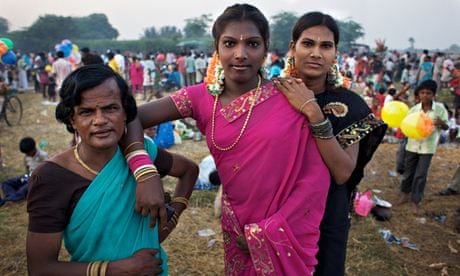With their glittering saris, bright makeup and a reputation for bawdy song and dance, hijras, India's transgender minority, are hard to miss. But this week, after years of discrimination, the community has finally been granted legal visibility.
On Tuesday the supreme court of India ruled that transgender people would be recognised on official documents under a seperate "third gender" category. The change follows similar legislation in Nepal, Pakistan and Bangladesh. This means that now, for the first time, there are quotas of government jobs and college places for hijras. The decision has been cheered by activists, who say that, despite its distinguished history, the community too often faces violence and harassment.
Shwetambera Parashar from the Humsafar Trust, an Indian NGO that campaigns for LGBT rights, says the exclusion faced by the community has been acute – from doctors refusing to examine or treat hijras, to police harrasment and discrimination keeping them locked out of mainstream employment. This week's change in the law is a "big step", she says, ensuring that discrimination can now be challenged.
Hijras, who can be eunuchs, intersex or transgender, have been part of South Asia's culture for thousands of years. Eunuchs are celebrated in sacred Hindu texts such as the Mahabharata and the Kama Sutra. They also enjoyed influential positions in the Mughal courts.
When the British came to power in India, the community's fortunes changed, with the disgusted colonists passing a law in 1897 classing all eunuchs as criminals. Since then many have been ostracised – either for cross dressing or being intersex – and have gone on to form their own communities, around a guru or mother figure to provide emotional and financial security. Many even took to using a secret code language known as Hijra Farsi for protection. More recently, hijras have been seen as auspicious and are often asked to bless celebrations such as marriages and births. In India's larger cities this has waned, forcing many to rely on begging or prostitution. The effect of this dangerous work and the community's limited access to health and welfare services can be seen in the staggering fact that HIV rates among hijras stand at 18% in Mumbai, while the rate among the wider population is only 0.3%.
Yet, despite welcoming the change in the law, Indian activists warn that not all transgender people feel comfortable being referred to as "third sex". Many prefer to be classed simply by the gender they have chosen, as women or men. Campaigners point out that more needs to be done to stop transgender people, and hijra communities in particular, from being criminalised – such as overturning the controversial section 377 law that makes homosexual acts a crime.
Bindiya Rana, who was the first transgender woman to stand as a provincial political candidate in Pakistan, says the changes in law in her own country, which came into effect in 2012, have not been enough to change lives.
"In Pakistan we are recognised and there are some jobs – mostly on three-month contracts or with NGOs – but not across the employment sector," she says. "The government have not supported us – they haven't implemented the law. I had more opposition when I fought in the election from politicians than I did from the public. Society in Pakistan is more understanding, more accepting and supportive of us than the government is. We have claimed our space in the law, but we are not protected by it."

Comments (…)
Sign in or create your Guardian account to join the discussion